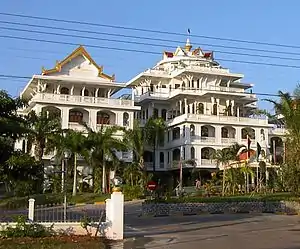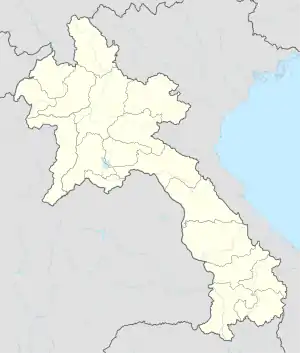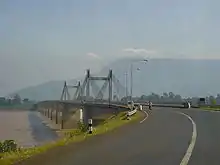Pakse
Pakse (or Pakxe; French: Paksé; Laotian: ປາກເຊ [pȁːk séː] 'mouth of the river'; Thai: ปากเซ), is the capital and most populous city of the southern Laotian province of Champasak, making it the second most populous city in Laos. At the confluence of the Xe Don and Mekong Rivers, it has a population of about 88,000.[1] It served as the capital of the Kingdom of Champasak until it was unified with the rest of Laos in 1946.
Pakse
ປາກເຊ | |
|---|---|
| Pakse District | |
 Champasak Palace Hotel, Pakse, formerly the palace of Boun Oum Na Champassak | |
 Pakse Location in Laos | |
| Coordinates: 15°07′N 105°47′E | |
| Country | Laos |
| Province | Champasak Province |
| District | Pakse District |
| Population (2010) | |
| • Total | 119,848 |
| • Religions | Buddhism |
| Time zone | UTC+7 (ICT) |
History
This city was founded by the French as an administrative outpost in 1905, and was formerly the capital of the Lao Kingdom of Champasak until 1946 when the Kingdom of Laos was formed. During the Franco-Thai war the French ceded Preah Vihear Province from Cambodia and the cis-Mekong part of Champasak Province opposite Pakse from Laos to Thailand.[2]
The city served as the primary seat and residence to Prince Boun Oum Na Champassak, an important figure in the Laotian Civil War. He built Champasak Palace, but fled in 1974 before it was completed. In May 1975, the town fell to Pathet Lao forces. Since 1975, Pakse has become an economic power and of regional importance. The construction of a bridge over the Mekong, built with Japanese aid, allowing road traffic with Ubon Ratchathani in Thailand, has further integrated the city with neighbouring countries.
Demographics
Pakse is home to many ethnic Chinese. In 1943, 62 % of the population of Pakse were Vietnamese.[3]
Religion

The population is predominantly Buddhist and the city has several temples. These include: Wat Luang, which was built in 1935 and is the largest temple in Pakse, and the Chinese temple Wat Sopsé.[4] Pakse is also the seat of the Roman Catholic Apostolic Vicariate of Paksé led by Cardinal Louis-Marie Ling Mangkhanekhoun.
Culture
The city has the Champasak Provincial Museum, which holds historical documents and artifacts of the province.
Infrastructure
Health
There are two hospitals in the city. One is the second largest in Laos, but many citizens travel across the border to Thailand as Thai hospitals are better equipped.[5] There is a high risk of malaria and dengue fever during the monsoon season.
Road

Pakse is on National Road 13, the main transportation highway of Laos. It has bridges over the Xe Don, the French and the Russian Bridges, and one bridge over the Mekong River, the Lao Nippon Bridge, only one of five bridges over the Mekong in Laos. Pakse is the gateway to the Bolaven Plateau, as well as to the southern provinces of Salavan, Sekong, and Attapeu.
Air
It is served by Pakse International Airport. Pakse Airport construction was completed on 2 November 2009,[6] resuming flights to Vientiane, Siem Reap, Ho Chi Minh City, and Bangkok.
Climate
Pakse has a tropical savanna climate (Köppen climate classification Aw) with very warm temperatures throughout the year. Temperatures are especially high in the months before the monsoon season (March–April). There is a distinct wet season (April–October) and dry season (November–March).
| Climate data for Pakse | |||||||||||||
|---|---|---|---|---|---|---|---|---|---|---|---|---|---|
| Month | Jan | Feb | Mar | Apr | May | Jun | Jul | Aug | Sep | Oct | Nov | Dec | Year |
| Record high °C (°F) | 36.7 (98.1) |
37.8 (100.0) |
37.8 (100.0) |
39.4 (102.9) |
38.3 (100.9) |
35.0 (95.0) |
33.9 (93.0) |
34.4 (93.9) |
34.4 (93.9) |
35.0 (95.0) |
34.4 (93.9) |
35.0 (95.0) |
39.4 (102.9) |
| Average high °C (°F) | 31.0 (87.8) |
32.7 (90.9) |
34.4 (93.9) |
34.8 (94.6) |
32.9 (91.2) |
31.0 (87.8) |
30.4 (86.7) |
30.1 (86.2) |
30.3 (86.5) |
30.8 (87.4) |
30.5 (86.9) |
30.2 (86.4) |
31.6 (88.9) |
| Daily mean °C (°F) | 23.2 (73.8) |
27.0 (80.6) |
29.7 (85.5) |
29.3 (84.7) |
28.1 (82.6) |
26.7 (80.1) |
26.7 (80.1) |
26.5 (79.7) |
27.3 (81.1) |
26.3 (79.3) |
25.5 (77.9) |
22.4 (72.3) |
26.6 (79.9) |
| Average low °C (°F) | 16.3 (61.3) |
21.4 (70.5) |
24.5 (76.1) |
24.9 (76.8) |
24.9 (76.8) |
23.9 (75.0) |
24.1 (75.4) |
24.3 (75.7) |
23.7 (74.7) |
22.9 (73.2) |
22.4 (72.3) |
19.7 (67.5) |
22.8 (73.0) |
| Record low °C (°F) | 8.3 (46.9) |
13.3 (55.9) |
12.8 (55.0) |
20.0 (68.0) |
21.7 (71.1) |
21.7 (71.1) |
21.7 (71.1) |
21.7 (71.1) |
20.0 (68.0) |
16.7 (62.1) |
13.9 (57.0) |
8.9 (48.0) |
8.3 (46.9) |
| Average precipitation mm (inches) | 2.0 (0.08) |
7.9 (0.31) |
19.8 (0.78) |
75.7 (2.98) |
223.1 (8.78) |
420.0 (16.54) |
383.2 (15.09) |
523.9 (20.63) |
297.5 (11.71) |
99.6 (3.92) |
19.3 (0.76) |
2.8 (0.11) |
2,074.8 (81.69) |
| Average rainy days | 0 | 1 | 2 | 7 | 15 | 21 | 22 | 25 | 13 | 12 | 10 | 0 | 128 |
| Average relative humidity (%) | 62 | 60 | 59 | 65 | 75 | 82 | 83 | 85 | 84 | 79 | 72 | 67 | 72.8 |
| Mean monthly sunshine hours | 278.0 | 247.3 | 285.6 | 221.5 | 218.3 | 136.2 | 145.2 | 125.5 | 160.6 | 193.6 | 225.5 | 258.9 | 2,496.2 |
| Source 1: NOAA (1961–1990)[7] | |||||||||||||
| Source 2: Deutscher Wetterdienst (extremes)[8] | |||||||||||||
Tourism
Pakse is growing as a tourist destination. Visitors to Pakse's Champasak Province have grown from 113,684 in 2006 to 493,180 in 2013.[9] Sites of interest include:
References
- "Population of Pakxé, Laos". Mongabay.com. Archived from the original on 2016-03-04. Retrieved 2014-12-08.
- Grabowsky, Volker. Regions and National Integration in Thailand 1892-1992. Wiesbaden: Harrassowitz, 1995.
- Stuart-Fox, Martin (1997). A History of Laos. Cambridge University Press, p. 51. ISBN 978-0-521-59746-3.
- "Pakse Town". Southern Laos. Southern Laos. Retrieved 25 October 2017.
- "Healthcare in Pakse". Archived from the original on October 19, 2013. Retrieved May 20, 2012.
- "Pakse; Information & Statistics,". Travel-Tourist-Information-Guide.com. Retrieved 2014-12-08.
- "Pakse Climate Normals 1961-1990". National Oceanic and Atmospheric Administration. Retrieved January 11, 2013.
- "Klimatafel von Pakse (Pakxé) / Laos" (PDF). Baseline climate means (1961-1990) from stations all over the world (in German). Deutscher Wetterdienst. Retrieved January 23, 2016.
- "2013 Statistical Report on Tourism in Laos". Sabaidee Laos. Tourism Marketing Department, Lao PDR. Retrieved 2014-12-08.
External links
 Pakse travel guide from Wikivoyage
Pakse travel guide from Wikivoyage- Sabaidee Laos: Pakse (official tourism website)
- Pakse, by official tourism website for Southern Laos
| Wikimedia Commons has media related to Pakse. |
